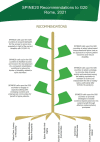SPINE20 recommendations 2021: spine care for people's health and prosperity
- PMID: 35391625
- PMCID: PMC8989125
- DOI: 10.1007/s00586-022-07194-y
SPINE20 recommendations 2021: spine care for people's health and prosperity
Abstract
Purpose: The focus of SPINE20 is to develop evidence-based policy recommendations for the G20 countries to work with governments to reduce the burden of spine disease, and disability.
Methods: On September 17-18, 2021, SPINE20 held its annual meeting in Rome, Italy. Prior to the meeting, the SPINE20 created six proposed recommendations. These recommendations were uploaded to the SPINE20 website 10 days before the meeting and opened to the public for comments. The recommendations were discussed at the meeting allowing the participants to object and provide comments.
Results: In total, 27 societies endorsed the following recommendations. SPINE20 calls upon the G20 countries: (1) to expand telehealth for the access to spine care, especially in light of the current situation with COVID-19. (2) To adopt value-based interprofessional spine care as an approach to improve patient outcomes and reduce disability. (3) To facilitate access and invest in the development of a competent rehabilitation workforce to reduce the burden of disability related to spine disorders. (4) To adopt a strategy to promote daily physical activity and exercises among the elderly population to maintain an active and independent life with a healthy spine, particularly after COVID-19 pandemic. (5) To engage in capacity building with emerging countries and underserved communities for the benefit of spine patients. (6) To promote strategies to transfer evidence-based advances into patient benefit through effective implementation processes.
Conclusions: SPINE20's initiatives will make governments and decision makers aware of efforts to reduce needless suffering from disabling spine pain through education that can be instituted across the globe.
Keywords: Advocacy group; G20; Recommendation; SPINE20; Spine.
© 2022. The Author(s).
Conflict of interest statement
All authors declares that they have no conflict of interest.
Figures
Similar articles
-
SPINE20 recommendations 2023: One Earth, one family, one future WITHOUT spine DISABILITY.Brain Spine. 2023 Oct 6;3:102688. doi: 10.1016/j.bas.2023.102688. eCollection 2023. Brain Spine. 2023. PMID: 38020998 Free PMC article. Review.
-
SPINE20 Recommendations 2024 -Spinal Disability: Social Inclusion as a Key to Prevention and Management.Global Spine J. 2025 Jan;15(1):8-20. doi: 10.1177/21925682241290226. Epub 2024 Oct 10. Global Spine J. 2025. PMID: 39387468 Free PMC article.
-
SPINE20 recommendations 2022: spine care-working together to recover stronger.Eur Spine J. 2022 Dec;31(12):3262-3273. doi: 10.1007/s00586-022-07432-3. Epub 2022 Nov 3. Eur Spine J. 2022. PMID: 36326928 Review.
-
SPINE20 A global advocacy group promoting evidence-based spine care of value.Eur Spine J. 2021 Aug;30(8):2091-2101. doi: 10.1007/s00586-021-06890-5. Epub 2021 Jun 9. Eur Spine J. 2021. PMID: 34106349 Review.
-
Distance Management of Spinal Disorders During the COVID-19 Pandemic and Beyond: Evidence-Based Patient and Clinician Guides From the Global Spine Care Initiative.JMIR Public Health Surveill. 2021 Feb 17;7(2):e25484. doi: 10.2196/25484. JMIR Public Health Surveill. 2021. PMID: 33471778 Free PMC article.
Cited by
-
SPINE20 recommendations 2023: One Earth, one family, one future WITHOUT spine DISABILITY.Brain Spine. 2023 Oct 6;3:102688. doi: 10.1016/j.bas.2023.102688. eCollection 2023. Brain Spine. 2023. PMID: 38020998 Free PMC article. Review.
-
Spinopelvic measurements of sagittal balance with deep learning: systematic review and critical evaluation.Eur Spine J. 2022 Aug;31(8):2031-2045. doi: 10.1007/s00586-022-07155-5. Epub 2022 Mar 12. Eur Spine J. 2022. PMID: 35278146
-
Decreased daily exercise since the COVID-19 pandemic and the deterioration of health-related quality of life in the elderly population: a population-based cross-sectional study.BMC Geriatr. 2022 Aug 16;22(1):678. doi: 10.1186/s12877-022-03316-9. BMC Geriatr. 2022. PMID: 35974303 Free PMC article.
-
SPINE20 Recommendations 2024 -Spinal Disability: Social Inclusion as a Key to Prevention and Management.Global Spine J. 2025 Jan;15(1):8-20. doi: 10.1177/21925682241290226. Epub 2024 Oct 10. Global Spine J. 2025. PMID: 39387468 Free PMC article.
-
Using medical storytelling to communicate problems and solutions in the low back pain conundrum: an evidence-based tale of twins.Chiropr Man Therap. 2023 Aug 8;31(1):25. doi: 10.1186/s12998-023-00499-9. Chiropr Man Therap. 2023. PMID: 37553703 Free PMC article.
References
-
- Beard JR, Officer A, de Carvalho IA, Sadana R, Pot AM, Michel JP, Lloyd-Sherlock P, Epping-Jordan JE, Peeters G, Mahanani WR, Thiyagarajan JA, Chatterji S. The World report on ageing and health: a policy framework for healthy ageing. Lancet. 2016;387:2145–2154. doi: 10.1016/S0140-6736(15)00516-4. - DOI - PMC - PubMed
-
- Cieza A, Causey K, Kamenov K, Hanson SW, Chatterji S, Vos T. Global estimates of the need for rehabilitation based on the global burden of disease study 2019: a systematic analysis for the global burden of disease study 2019. Lancet. 2021;396:2006–2017. doi: 10.1016/S0140-6736(20)32340-0. - DOI - PMC - PubMed
-
- World Health Organization, Rehabilitation 2030: A Call for Action. https://www.who.int/rehabilitation/rehab-2030-call-for-action/en/ - PubMed
-
- https://global-health-summit.europa.eu/rome-declaration_en. Global Health Summit, European Union


